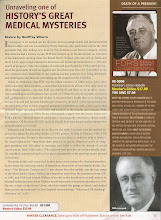As I have just written a prominent FDR historian, our book presents a scenario that FDR may have had two cancers. This is a understandably tenuous assertion, considering that as yet, it is not accepted that he even had one! While most of the contemporary rumors centered around prostate cancer, obviously we are making a case for the melanoma as well.
The basis for this idea is anchored the evidence-based scientific literature.
One reason is medical statistics. If indeed the fatal hemorrahge emanating from the right side of FDR's brain was from a metastatic tumor as we believe, then it could not have come from a prostatic primary, since prostate cancer virtually never metastasizes to the brain (less than a handful of reported cases in the entire medical literature). On the other hand, melanoma is the tumor with the greatest propensity of all to metastasize to the brain. Over 90% of patients have brain metastases at autopsy and, in 25-50% of melanoma patients, the terminal event is brain hemorrhage!
As far as the abdominal tumor is concerned, this is a little less clear. We are convinced that the highest probablity for FDR's weight loss was a partial bowel obstruction. All of the Frank Lahey/George Pack references in the book are testimony to it. It makes no sense whatsoever for America's greatest abdominal surgeon at the time (Lahey) to be offering a prognosis on a cardiac standpoint. In addition, Howard Bruenn clearly states in his 1970 paper that when Lahey examined FDR in April, the condition was serious enough that it warranted informing the President (quite concordant to what later appeared in the Lahey memorandum!).
Both prostate cancer and melanoma frequently metastasize to the bowel, though melanoma is notorious for intussusception (intermittent telescoping of the bowel into itself) that produces the intense abdominal pain consistent with symptoms exhibited by FDR at Teheran (November 1943), Hobcaw (April 1944) and Camp Pendleton, near San Diego (August 1944).
Short of an open biopsy, for which there is no evidence FDR ever underwent, it is not possible to say with certainty which one it was. Even today, a pre-operative diagnosis of malignant bowel obstruction from melanoma is often missed.
It is our belief that it was indeed melanoma though with less assurance than for the brain metastasis, but the very real possibility is raised that FDR's doctors did not know, and may never have known, exactly which malignancy was the source of the abdominal pain (the "growth" even FDR himself suspected, albeit temporarily, when he told Harold Ickes about it in May 1944).
Our discussions with melanoma specialists about the time frame for the maligant bowel obstruction reveals that it is entirely consistent with contemporary thinking. This is not the case for the brain metatastasis, hence we could not postulate that metastatic disease was the cause of the seizures, which appear to have been on the basis of an otherwise clinically silent stroke (Dr. Wold may have been partially right, but for the wrong reason).
All of this thinking has evolved over three years of intensive research and discussions with countless expert physicians. We sincerely hope and believe that it will eventually come to be accepted by historians as the reality of FDR's medical history, though, as all things new and radically different, it will be subject to a vigorous debate.
Friday, September 25, 2009
Subscribe to:
Post Comments (Atom)





No comments:
Post a Comment